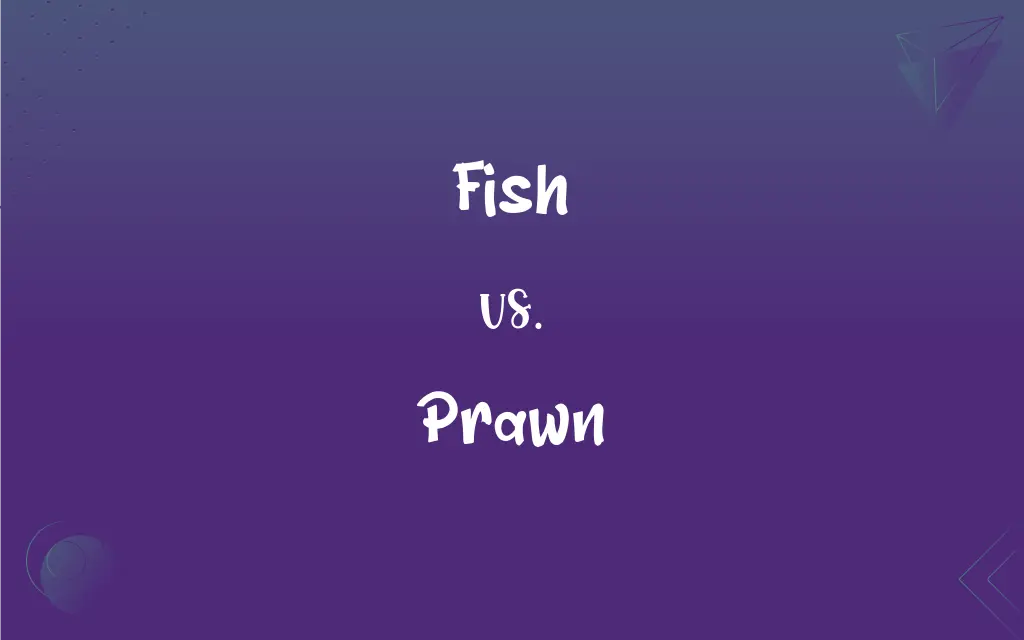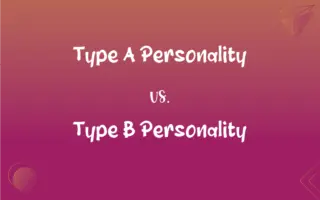Fish vs. Prawn: What's the Difference?
Edited by Aimie Carlson || By Harlon Moss || Updated on October 14, 2023
Fish are cold-blooded aquatic vertebrates with gills and fins. Prawn is a crustacean, similar to a large shrimp, having a slender body and long legs.

Key Differences
Fish, prominently characterized by their vertebral columns, possess scales, gills, and fins that assist in aquatic mobility, exhibiting a myriad of sizes and colors. Prawns, being crustaceans, belong to the Arthropoda phylum, showcasing external skeletons, jointed legs, and no spinal structure, thereby placing them in distinct biological classifications. The intricate world of fish varies immensely, from tiny guppies to gigantic whales, presenting a substantial divergence when contrasted with prawns, who generally exhibit a more consistent size range.
Observing fish in various aquatic environments reveals their astonishing adaptability, with species inhabiting oceans, rivers, ponds, and lakes, exhibiting a diverse range of survival strategies. On the other hand, prawns typically inhabit fresh and saltwater environments, demonstrating a propensity for dwelling in calm, warm waters, thus revealing contrasting ecological presences and survival adaptations between fish and prawns. While fish are vastly widespread, prawns, especially certain species, are more geographically and environmentally restricted.
Fish, with their sophisticated internal bone structures, have the ability to navigate through water with a range of motion, facilitated by their muscular anatomy and fin arrangements. Prawns, possessing an exoskeleton, navigate using swimmerets and primarily rely on a backward thrust motion, reflecting a stark difference in both anatomical structure and locomotion capabilities between fish and prawn. Prawns' legs and the tail-fan are key to their swift, backward escape strategy, distinguishing their movement from the steady, forward swimming seen in many fish.
When considering culinary contexts, fish are celebrated for their lean meat, contributing to various global cuisines in baked, fried, and grilled forms, embodying a staple in numerous diets. Prawns, prized for their delicate, sweet flesh, are similarly esteemed in culinary circles, being utilized in diverse dishes, though they present different textures and flavors compared to fish. Culinary techniques for fish often involve accommodating their larger size and varied shapes, while prawn dishes might focus on accentuating their distinct, often sweeter, flavor.
Fish, in the vast spectrum of species, serve pivotal roles in aquatic ecosystems, acting as predators, prey, and contributing to nutrient cycles, underpinning the balance of underwater life. Prawns, notwithstanding their smaller stature and specific dietary habits, equally fulfill vital ecological roles, serving as both predators of smaller organisms and prey for larger entities, highlighting both fish and prawn as crucial, albeit in different capacities and trophic levels, within their respective ecosystems. Each organism, though different, contributes substantially to sustaining balance within their respective ecological contexts.
ADVERTISEMENT
Comparison Chart
Plural Form
Fish (usually unchanged)
Prawns
Syllables
1
1
Part of Speech
Noun (can also be a verb)
Noun
Usage in an Idiom
"A fish out of water"
(not commonly used in idioms)
Associated Adjective
Fishy
Prawny (less common)
ADVERTISEMENT
Fish and Prawn Definitions
Fish
As a verb, fish means to catch or try to catch fish.
Every summer, we fish at the tranquil lakeside.
Prawn
Prawn, in a culinary context, often refers to a dish or preparation style of the crustacean.
The prawn cocktail is the restaurant's signature starter.
Fish
Fish are aquatic animals with gills and fins, usually covered in scales.
The fish swam rapidly through the vibrant coral reef.
Prawn
Prawns, often referred to in fisheries and zoology, can denote specific crustacean species.
The biologist studied the mating habits of the giant tiger prawn.
Fish
In a colloquial sense, "fish" may denote an instance of seeking or garnering something.
She continued to fish for compliments by downplaying her achievements.
Prawn
A prawn is a long-shelled, edible aquatic crustacean.
The chef prepared a spicy garlic prawn dish for dinner.
Fish
Figuratively, "fish" refers to someone who is easily deceived.
New gamblers are often the fish at a poker table.
Prawn
The term prawn can also refer to the action of catching prawns.
Local fishers prawn in these waters during the summer months.
Fish
Fish, in a zodiacal context, refers to the Pisces star sign.
As a fish, she found her horoscope to be uncannily accurate.
Prawn
In informal British terms, prawn can mean a foolish or naive person.
Stop being such a prawn and think before you act!
Fish
Any of numerous cold-blooded aquatic vertebrates characteristically having fins, gills, and a streamlined body and including the bony fishes, such as catfishes and tunas, and the cartilaginous fishes, such as sharks and rays.
Prawn
Any of various shrimps, especially one that is large or inhabits fresh water.
Fish
Any of various jawless aquatic craniates, including the lampreys and hagfishes.
Prawn
The flesh of a prawn, used as food.
FAQs
Are prawns a type of fish?
No, prawns are crustaceans and belong to the Arthropoda phylum, while fish are vertebrates.
What is the primary difference between a fish and a prawn?
Fish are vertebrates with internal bones, while prawns are crustaceans with external skeletons.
Do prawns have gills like fish?
Yes, prawns also have gills, but their structure and location differ from those of fish.
Which is larger in size, fish or prawn?
Fish vary vastly in size, from tiny guppies to huge sharks, while prawns generally have a more consistent, smaller size range.
Can fish and prawns be consumed raw?
Both can be consumed raw in dishes like sushi or ceviche, but it's essential that they are fresh and appropriately prepared.
Are all fish edible, and are all prawns edible?
While many fish are edible, some are not due to toxicity or poor taste. Most prawns are edible, but their freshness and preparation are crucial.
How do fish breathe underwater?
Fish breathe underwater using gills, which extract oxygen from the water.
Can both fish and prawns live in both freshwater and saltwater?
Some fish species can transition between freshwater and saltwater, while others cannot. Prawns can also be found in both freshwater and saltwater, depending on the species.
Which is more nutritionally beneficial, fish or prawn?
Both are nutritious. Fish are often sources of omega-3 fatty acids, while prawns are low in fat and high in protein.
Which has a longer lifespan, fish or prawn?
Lifespan varies widely among fish species, with some living for decades. Prawns generally have shorter lifespans, often around 1-2 years.
Do both fish and prawns have eyes?
Yes, both have eyes, but their structure and functionality differ due to their distinct evolutionary paths.
How do prawns protect themselves, and is it similar to fish?
Prawns often use camouflage or hide in crevices. Fish employ various strategies, including camouflage, schooling, or using venomous spines.
Why do prawns turn pink when cooked, while most fish do not?
The pink color in cooked prawns results from heat-induced chemical changes in their astaxanthin pigment. Fish flesh color changes vary based on their specific pigments and muscle type.
How do fish reproduce, and how do prawns reproduce?
Fish have various reproductive methods, including laying eggs or live birth. Prawns lay eggs, which hatch into larvae.
Is the way fish and prawns sense their environment similar?
Both use sensory organs, but fish heavily rely on their lateral line and ears for sensing vibrations, while prawns use their antennae for touch and taste.
Which is more popular in global cuisine, fish or prawn?
Both are immensely popular, with fish being a staple in many cultures and prawns being a delicacy in various cuisines.
What's the primary difference in the locomotion of fish and prawn?
Fish primarily use their fins to navigate, while prawns use swimmerets and a backward thrust motion.
Is it true that prawns and shrimp are the same?
While often used interchangeably in culinary contexts, prawns and shrimp are different species with distinct anatomical differences.
Why do fish have a "fishy" smell, and do prawns have a similar odor?
The "fishy" smell comes from amines in fish. Fresh prawns have a milder odor, but if not fresh, they can emit a strong, unpleasant smell.
Why do fish have scales, and do prawns have them too?
Fish have scales to provide protection and streamline their bodies. Prawns don't have scales but have an exoskeleton.
About Author
Written by
Harlon MossHarlon is a seasoned quality moderator and accomplished content writer for Difference Wiki. An alumnus of the prestigious University of California, he earned his degree in Computer Science. Leveraging his academic background, Harlon brings a meticulous and informed perspective to his work, ensuring content accuracy and excellence.
Edited by
Aimie CarlsonAimie Carlson, holding a master's degree in English literature, is a fervent English language enthusiast. She lends her writing talents to Difference Wiki, a prominent website that specializes in comparisons, offering readers insightful analyses that both captivate and inform.































































